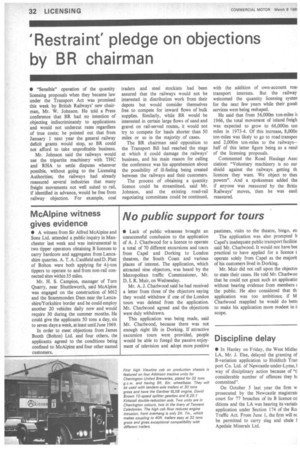' Restraint' pledge on objections by BR chairman
Page 34

If you've noticed an error in this article please click here to report it so we can fix it.
• "Sensible" operation of the quantity licensing proposals when they became law under the Transport Act was promised this week by British Railways' new chairman, Mr. W. Johnson. He told a Press conference that BR had no intention of objecting indiscriminately to applications and would not undercut rates regardless of true costs; he pointed out that from January 1 next year the general railway deficit grants would stop, so BR could not afford to take unprofitable business.
Mr. Johnson said the railways would use the tripartite machinery with THC and RHA to settle disputes wherever possible, without going to the Licensing Authorities; the railways had already reassured several industries that many freight movements not well suited to rail, if identified in advance, would be free from railway objection. For example, coal traders and steel stockists had been assured that the railways would not be interested in distribution work from their depots but would consider themselves free to compete for inward flows of bulk supplies. Similarly, while BR would be interested in certain large flows of sand and gravel on rail-served routes, it would not try to compete for hauls shorter than 50 miles or so in the majority of cases.
The BR chairman said opposition to the Transport Bill had reached the stage at which it could damage the railways' business, and his main reason for calling the conference was his apprehension about the possibility of ill-feeling being created between the railways and their customers.
The process of obtaining a quantity licence could be streamlined, said Mr. Johnson, and the existing road-rail negotiating committees could be continued, with the addition of own-account roae transport interests. But the railway welcomed the quantity licensing systen for the next few years while their good; services were being reshaped.
He said that from 56,000m ton-miles i] 1966, the total movement of inland freigh was expected to grow to 66,000m ton miles in 1973-4. Of this increase, 8,000n ton-miles was likely to go to road transpor and 2,000m ton-miles to the railways— half of this latter figure being as a resul of the licensing proposals.
Commented the Road Haulage Asso ciation: "Voluntary machinery is no sur shield against the railways getting th licences they want. We object to thes powers". And a spokesman added tha if anyone was reassured by the Britis Railways' moves, then he was easil reassured.




































































































































